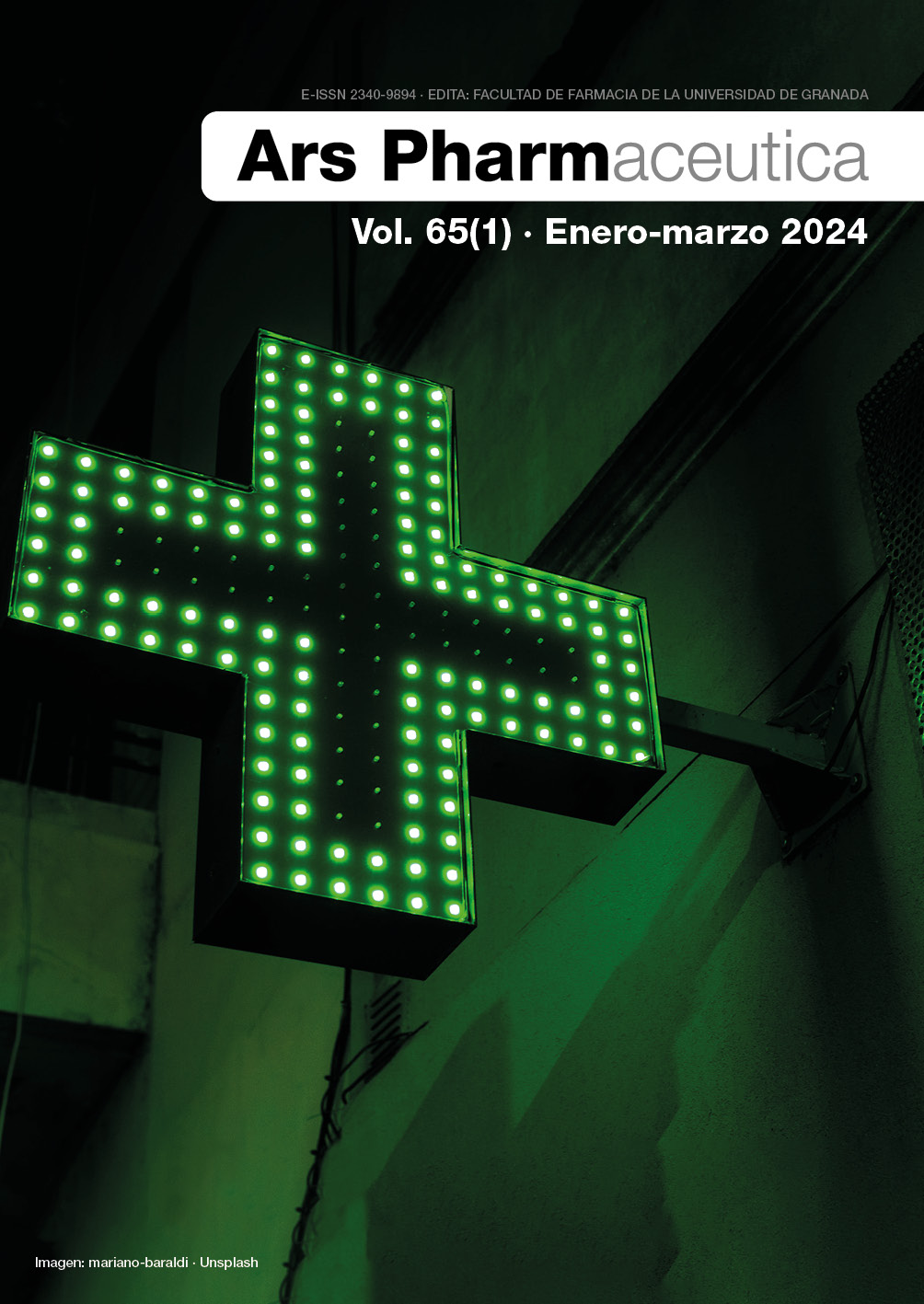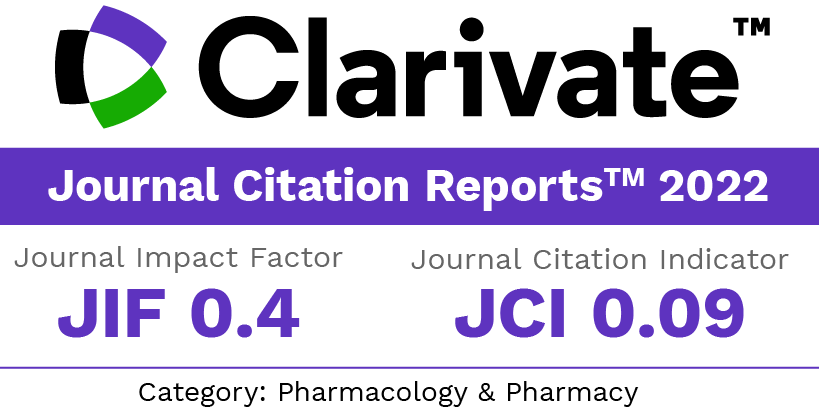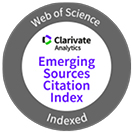Identification of factors determining non-adherence to oral antidiabetics in patients with type 2 diabetes mellitus: Systematic review
DOI:
https://doi.org/10.30827/ars.v65i1.29147Keywords:
Diabetes Mellitus, Type 2; Hypoglycemic Agents; Medication Adherence; Risk Factors; Systematic reviewAbstract
Introduction: Adherence to oral antidiabetic treatment (OAHA) in patients with type 2 Diabetes mellitus (T2DM) is far from reaching the desirable figures. A multitude of studies have been published on factors that influence non-adherence, although with different populations and methodologies. Therefore, the aim of this systematic review was identify and collect those factors that may influence non-adherence to OAHAs treatment in patients with T2DM.
Method: The databases used in the literature search were Medline (PubMed), Scopus, CINAHL and PsycINFO. We considered case-control studies, cohorts and randomised clinical trials conducted in people with T2DM and OAHA treatment, where determinants of adherence were evaluated. The review process was conducted independently by two investigators based on Prisma recommendations.
Results: Of 11 publications selected, two were case-control studies and nine were cohort studies (seven retrospective). Non-adherence figures ranged from 20.3 to 48 %. Factors associated with non-adherence to OAHAs were found to be: patient co-payment, daily OAHA dose, type of OAHA prescribed, number of medications prescribed, less frequent appointments with healthcare staff, high HbA1C levels, depression, female sex, race/ethnicity (other than white), marital status (other than married) and age.
Conclusions: From a clinical point of view, it is important to identify which risk factors are modifiable and thus, healthcare professionals will be able to design actions for patients to improve their adherence to OAHAs treatment as well as improve T2DM control.
Downloads
References
International Diabetes Federation. IDF Diabetes Atlas. 10a Edition, 2021. [acceso febrero 2022].https://diabetesatlas.org/atlas/tenth-edition/
Soriguer F, Goday A, Bosch-Comas A, et al. Prevalence of diabetes mellitus and impaired glucose regulation in Spain: the Di@bet.es Study. Diabetologia. 2012; 55(1):88-93. doi:10.1007/s00125-011-2336-9
Rojo-Martínez G, Valdés S, Soriguer F, et al. Incidence of diabetes mellitus in Spain as results of the nation-wide cohort di@bet.es study. Sci Rep. 2020; 10(1):2765. doi:10.1038/s41598-020-59643-7
Ministerio de Sanidad de España. PRESTACIÓN FARMACÉUTICA EN EL SNS. 2019. INFORME MONOGRÁFICO; 2021. [acceso 22 de noviembre de 2022]. Disponible en: https://www.mscbs.gob.es/estadEstudios/estadisticas/sisInfSanSNS/tablasEstadisticas/InfAnSNS.htm
Williams R, Van Gaal L, Lucioni C. Assessing the impact of complications on the costs of Type II diabetes. Diabetologia. 2002; 45(1):S13-S17. doi:10.1007/s00125-002-0859-9
De Pablos-Velasco P, Parhofer KG, Bradley C. et al. Current level of glycaemic control and its associated factors in patients with type 2 diabetes across Europe: data from the PANORAMA study. Clin Endocrinol (Oxf). 2014;80(1):47-56. doi:10.1111/cen.12119
Holman RR, Paul SK, Bethel MA, Matthews DR, Neil HAW. 10-year follow-up of intensive glucose control in type 2 diabetes. N Engl J Med. 2008 359(15):1577-1589. doi:10.1056/NEJMoa0806470
Guía ESC 2019 sobre diabetes, prediabetes y enfermedad cardiovascular, en colaboración con la European Association for the Study of Diabetes (EASD). Rev Esp Cardiol. 2020; 73(5):404.e1-404.e59. doi:10.1016/j.recesp.2019.11.024
Egede LE, Gebregziabher M, Echols C, Lynch CP. Longitudinal Effects of Medication Nonadherence on Glycemic Control. Ann Pharmacother. 2014 ;48(5):562-570. doi:10.1177/1060028014526362
Krass I, Schieback P, Dhippayom T. Adherence to diabetes medication: a systematic review. Diabet Med. 2015; 32(6):725-737. doi:10.1111/dme.12651
Iglay K, Cartier SE, Rosen VM, et al. Meta-analysis of studies examining medication adherence, persistence and discontinuation of oral antihyperglycemic agents in type 2 diabetes. Curr Med Res Opin. 2015; 31(7):1283-1296. doi:10.1185/03007995.2015.1053048
Moreno Juste A, Gimeno Miguel A, Poblador Plou B, et al. Adherence to treatment of hypertension. hypercholesterolaemia and diabetes in an elderly population of a Spanish cohort. Med Clin (Barc). 2019; 153(1):1-5. doi:10.1016/j.medcli.2018.10.023
Capoccia K, Odegard PS, Letassy N. Medication Adherence With Diabetes Medication: A Systematic Review of the Literature. Diabetes Educ. 2016; 42(1):34-71. doi:10.1177/0145721715619038
Barba EL, de Miguel MR, Hernández-Mijares A, et al. Medication adherence and persistence in type 2 diabetes mellitus: Perspectives of patients, physicians and pharmacists on the Spanish health care system. Patient Prefer Adherence. 2017;11:707-718. doi:10.2147/PPA.S122556
Tiv M, Viel JF, Mauny F, et al. Medication adherence in type 2 diabetes: the ENTRED study 2007. A French Population-Based Study. PloS One. 2012; 7(3):e32412. doi:10.1371/journal.pone.0032412
Tunceli K, Iglay K, Zhao C, Brodovicz KG, Radican L. Factors associated with adherence to oral antihyperglycemic monotherapy in patients with type 2 diabetes mellitus in the United Kingdom. Diabetes Res Clin Pract. 2015; 109(3):e27-e31. doi:10.1016/j.diabres.2015.05.031
Farmaindustria. Revisión sistemática de la evidencia en materia de adherencia terapéutica. FarmaIndustria. [acceso 22 de noviembre de 2022]. Disponible en: https://www.farmaindustria.es/web/documento/revision-sistematica-la-evidencia-materia-adherencia-terapeutica/
Kirkman MS, Rowan-Martin MT, Levin R, et al. Determinants of Adherence to Diabetes Medications: Findings From a Large Pharmacy Claims Database. Diabetes Care. Published online January 8. 2015:dc142098. doi:10.2337/dc14-2098
García-Pérez LE, Álvarez M, Dilla T, Gil-Guillén V, Orozco-Beltrán D. Adherence to Therapies in Patients with Type 2 Diabetes. Diabetes Ther. 2013;4(2):175-194. doi:10.1007/s13300-013-0034-y
Chan AHY, Cooper V, Lycett H, Horne R. Practical Barriers to Medication Adherence: What Do Current Self- or Observer-Reported Instruments Assess? Front Pharmacol. 2020 ;11:572. doi:10.3389/fphar.2020.00572
Jaam M, Ibrahim MIM, Kheir N, Awaisu A. Factors associated with medication adherence among patients with diabetes in the Middle East and North Africa region: A systematic mixed studies review. Diabetes Res Clin Pract. 2017;129:1-15. doi:10.1016/j.diabres.2017.04.015
Polonsky WH, Henry RR. Poor medication adherence in type 2 diabetes: recognizing the scope of the problem and its key contributors. Patient Prefer Adherence. 2016;10:1299-1307. doi:10.2147/PPA.S106821
Page MJ, McKenzie JE, Bossuyt PM, et al. The PRISMA 2020 statement: An updated guideline for reporting systematic reviews. J Clin Epidemiol. 2021; 134:178-189. doi:10.1016/j.jclinepi.2021.03.001
Kostev K, Jacob L. Association between depression and persistence with oral antihyperglycemic drugs in type 2 diabetes mellitus patients in Germany. Psychiatry Res. 2018;261:90-93. doi:10.1016/j.psychres.2017.12.058
Kivimäki M, Batty GD, Hamer M, et al. Influence of retirement on nonadherence to medication for hypertension and diabetes. CMAJ Can Med Assoc J J Assoc Medicale Can. 2013;185(17):E784-790. doi:10.1503/cmaj.122010
McGovern A, Hinton W, Calderara S, Munro N, Whyte M, de Lusignan S. A Class Comparison of Medication Persistence in People with Type 2 Diabetes: A Retrospective Observational Study. Diabetes Ther Res Treat Educ Diabetes Relat Disord. 2018; 9(1):229-242. doi:10.1007/s13300-017-0361-5
Kreyenbuhl J, Dixon LB, McCarthy JF, Soliman S, Ignacio RV, Valenstein M. Does adherence to medications for type 2 diabetes differ between individuals with vs without schizophrenia? Schizophr Bull. 2010;36(2):428-435. doi:10.1093/schbul/sbn106
Flory JH, Keating SJ, Siscovick D, Mushlin AI. Identifying prevalence and risk factors for metformin non-persistence: a retrospective cohort study using an electronic health record. BMJ Open. 2018;8(7):e021505. doi:10.1136/bmjopen-2018-021505
Axon R, Gebregziabher M, Hunt K, et al. Comorbid depression is differentially associated with longitudinal medication nonadherence by race/ethnicity in patients with type 2 diabetes. Medicine (Baltimore). 2016;95(25). doi:10.1097/MD.0000000000003983
Lunghi C, Zongo A, Moisan J, Grégoire JP, Guénette L. The impact of incident depression on medication adherence in patients with type 2 diabetes. Diabetes Metab. 2017;43(6):521-528. doi:10.1016/j.diabet.2017.07.003
Lunghi C, Zongo A. Moisan J, Grégoire JP, Guénette L. Factors associated with antidiabetic medication non-adherence in patients with incident comorbid depression. J Diabetes Complications. 2017;31(7):1200-1206. doi:10.1016/j.jdiacomp.2017.02.016
Simard P, Presse N, Roy L, et al. Persistence and adherence to oral antidiabetics: a population-based cohort study. Acta Diabetol. 2015;52(3):547-556. doi:10.1007/s00592-014-0692-x
Tunceli K, Zhao C, Davies MJ, et al. Factors associated with adherence to oral antihyperglycemic monotherapy in patients with type 2 diabetes. Patient Prefer Adherence. 2015;9:191-197. doi:10.2147/PPA.S71346
Gourzoulidis G, Kourlaba G, Stafylas P, Giamouzis G, Parissis J, Maniadakis N. Association between copayment, medication adherence and outcomes in the management of patients with diabetes and heart failure. Health Policy Amst Neth. 2017;121(4):363-377. doi:10.1016/j.healthpol.2017.02.008
Sinnott SJ, Buckley C, O′Riordan D, Bradley C, Whelton H. The Effect of Copayments for Prescriptions on Adherence to Prescription Medicines in Publicly Insured Populations; A Systematic Review and Meta-Analysis. PLOS ONE. 2013;8(5):e64914. doi:10.1371/journal.pone.0064914
Gonzalez JS, Peyrot M, McCarl LA, et al. Depression and Diabetes Treatment Nonadherence: A Meta-Analysis. Diabetes Care. 2008;31(12):2398-2403. doi:10.2337/dc08-1341
Claxton AJ, Cramer J, Pierce C. A systematic review of the associations between dose regimens and medication compliance. Clin Ther. 2001;23(8):1296-1310. doi:10.1016/s0149-2918(01)80109-0
Lavernia F, Adkins SE, Shubrook JH. Use of oral combination therapy for type 2 diabetes in primary care: Meeting individualized patient goals. Postgrad Med. 2015;127(8):808-817. doi:10.1080/00325481.2015.1085293
McGovern A, Tippu Z, Hinton W, Munro N, Whyte M, Lusignan S de. Comparison of medication adherence and persistence in type 2 diabetes: A systematic review and meta-analysis. Diabetes Obes Metab. 2018;20(4):1040-1043. doi:10.1111/dom.13160
Doggrell SA, Warot S. The association between the measurement of adherence to anti-diabetes medicine and the HbA1c. Int J Clin Pharm. 2014;36(3):488-497. doi:10.1007/s11096-014-9929-6
García Díaz E, Ramírez Medina D, García López A, Morera Porras ÓM. Determinantes de la adherencia a los hipoglucemiantes y a las visitas médicas en pacientes con diabetes mellitus tipo 2. Endocrinol Diabetes Nutr. 2017;64(10):531-538. doi:10.1016/j.endinu.2017.08.004
Egede LE, Gebregziabher M, Hunt KJ, et al. Regional, Geographic, and Ethnic Differences in Medication Adherence Among Adults with Type 2 Diabetes. Ann Pharmacother. 2011;45(2):169-178. doi:10.1345/aph.1P442
García Alfaro I, Carballeira Rodríguez JD. Receta electrónica: limitaciones y posibles mejoras para asegurar una mayor adherencia a los tratamientos. Rev Esp Salud Pública.2019;93: 25 de septiembre e201909070.
Añel Rodríguez RM, García Alfaro I, Bravo Toledo R, Carballeira Rodríguez JD. [Electronic medical record and prescription: risks and benefits detected since its implementation. Safe designing. rollout and use]. Aten Primaria. 2021;53 Suppl 1:102220. doi:10.1016/j.aprim.2021.102220
Grandy S, Fox KM, Hardy E. Association of Weight Loss and Medication Adherence Among Adults With Type 2 Diabetes Mellitus: SHIELD (Study to Help Improve Early evaluation and management of risk factors Leading to Diabetes). Curr Ther Res Clin Exp. 2013;75:77-82. doi:10.1016/j.curtheres.2013.06.004
Wishah RA, Al-Khawaldeh OA, Albsoul AM. Impact of pharmaceutical care interventions on glycemic control and other health-related clinical outcomes in patients with type 2 diabetes: Randomized controlled trial. Diabetes Metab Syndr. 2015;9(4):271-276. doi:10.1016/j.dsx.2014.09.001
Negarandeh R, Mahmoodi H, Noktehdan H, Heshmat R, Shakibazadeh E. Teach back and pictorial image educational strategies on knowledge about diabetes and medication/dietary adherence among low health literate patients with type 2 diabetes. Prim Care Diabetes. 2013;7(2):111-118. doi:10.1016/j.pcd.2012.11.001
Downloads
Published
How to Cite
Issue
Section
License
Copyright (c) 2023 Elisabet Esquivel-Prados

This work is licensed under a Creative Commons Attribution-NonCommercial-ShareAlike 4.0 International License.
The articles, which are published in this journal, are subject to the following terms in relation to the rights of patrimonial or exploitation:
- The authors will keep their copyright and guarantee to the journal the right of first publication of their work, which will be distributed with a Creative Commons BY-NC-SA 4.0 license that allows third parties to reuse the work whenever its author, quote the original source and do not make commercial use of it.
b. The authors may adopt other non-exclusive licensing agreements for the distribution of the published version of the work (e.g., deposit it in an institutional telematic file or publish it in a monographic volume) provided that the original source of its publication is indicated.
c. Authors are allowed and advised to disseminate their work through the Internet (e.g. in institutional repositories or on their website) before and during the submission process, which can produce interesting exchanges and increase citations of the published work. (See The effect of open access).























